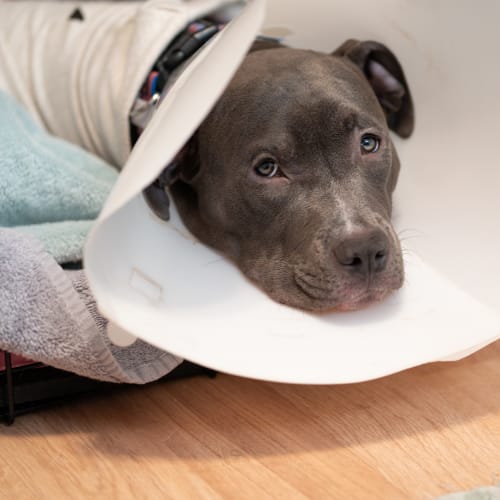What is the CCL, Cruciate, or ACL in dogs?
In dogs, the cranial cruciate ligament (often referred to as the CCL, ACL or cruciate) is a strip of tissue connecting the tibia (shin bone) to the femur (thigh bone). In humans this ligament is known as the anterior cruciate ligament or ACL.
A dog's cruciate is a load bearing ligament because the dog's leg remains bent when standing. If your dog's cruciate becomes injured or torn, your dog's knee will become unstable, reducing your dogs ability to run and walk normally and causing pain.

Signs of a Cruciate Injury in Dogs
Signs that your dog has injured their cruciate may appear suddenly but typically develop gradually over a period of a few weeks. The most common signs of a cruciate injury include:
- Hind leg lameness and limping
- Stiffness after rest, following exercise
- Swelling around the knee
- Difficulty rising and jumping
If your dog has a mildly injured cruciate but continues to have an active lifestyle including long walks, running and jumping, the injury will become more serious and symptoms will become increasingly more pronounced. Contact your vet if your dog is displaying any of the symptoms listed above. Many dogs with a single torn cruciate will go on to injure the other hind leg also, causing severe mobility issues and pain for your pet.
TPLO - Tibial Plateau Leveling Osteotomy Surgery
If your dog is suffering from a torn cruciate, your Winston-Salem vet may recommend TPLO or Tibial Plateau Leveling Osteotomy surgery to treat the injury.
TPLO surgery eliminates the need for the cranial cruciate ligament by reconfiguring the knee, rather than supplementing the ligament with the use of a suture through an Extracapsular Repair.
TPLO surgery involves making a curved cut in the tibia from the front to the back, then the top section (the tibial plateau) is rotated backward until the angle between the tibia and femur is appropriately level. Once the tibial plateau is in the desired position a metal plate is attached to the bone to stabilize the two sections while they heal in their new configuration.
Recovery from TPLO Surgery in Dogs
The fact is that regardless of which surgery you choose to treat your dog's torn cruciate, full recovery will take about 12-16 weeks, however recovering from TPLO surgery is relatively quick. Many dogs will be walking on the leg as soon as 24 hours after surgery, and most will be bearing moderate amounts of weight on the leg within 2 weeks. Following your vet's post-operative instructions will help your dog to avoid re-injuring the leg while it's still healing. Your dog should not be permitted to run or jump after TPLO surgery until the knee has had time to heal. You can expect your dog to return to full physical activity approximately 6 months after TPLO surgery.
At Carolina Veterinary Specialists in Winston-Salem, our compassionate veterinarians and board-certified specialists extend services provided by your primary care veterinarian. We work with your vet to provide first-rate specialty and emergency care for pets in North Carolina.
